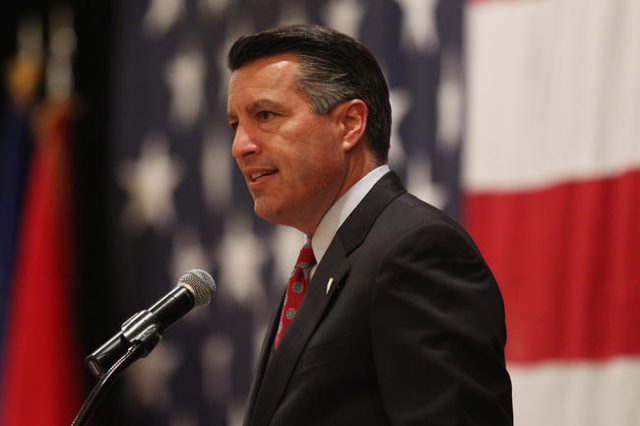Nevada works to fix parole backlog that keeps poor behind bars
Nevada is working to fix a system that keeps paroled prisoners behind bars because they're too poor to pay for somewhere to live on the outside.
The fix: giving inmates deemed ready for release a place to go.
Steps toward a solution won't require any construction. Two state departments — Corrections, which oversees prisons, and Public Safety, which oversees parole and probation — will work together at Casa Grande, an existing Las Vegas facility that is set up for parolees to go job hunting and get used to life beyond incarceration.
Up to now, state officials contended they faced an uphill battle convincing prisoners to leave. The prisoners would rather just let their full sentence run out so they could hit the streets without a parole officer watching their every move.
But April's backlog indicated only 16 percent of parolees who stayed behind bars were there by choice, and a little under half the total were held up while reworking release plans that would be found suitable by parole officials.
The Clark County Public Defender's Office and prison reform advocates and experts said the backlog was a burden on taxpayers and at odds with rehabilitation and public safety goals.
Sending parolees to Casa Granda is the state's first move to trim the parole backlog since a Las Vegas Review-Journal investigation published in February found that some inmates stayed locked up for years after the state determined they should be released. That backlog costs some $4 million a year in public money.
"Casa Grande will serve as a transitional center where numerous agencies will continue to work with the offenders to provide access to resources available that may help them develop a supervision plan to advance their release," Gov. Brian Sandoval's spokeswoman, Mari St. Martin, said in an email.
Casa Grande cost-effective
The 400-bed Casa Grande Transitional Housing Facility, on Russell Road near Valley View Boulevard, has been around since 2005. It's been the site of a program for low-risk inmates within 18 months of their probable parole release date. They are still technically incarcerated, but have the freedom to work, go to school and volunteer in the community.
On average there are about 260 prisoners in that program there.
Roughly 25 parolees — who will be under less supervision than the incarcerated inmates at the facility — will move in this week. The plan is to slowly expand to 100 parolees. If the parole program works well, the state has a new transitional facility in the northern part of the state it can use for the same purpose.
It's a move that will save the state money. The Department of Corrections estimates it costs roughly $55 a day to house an inmate in prison, compared to about $12 a day at Casa Grande — $4 for Corrections plus about $8 a day for Parole and Probation supervision.
Casa Grande's sleeping quarters look more like college dorm rooms than jail cells. The grounds resemble what one might see at a Las Vegas Valley apartment complex.
"By design it's a really nice facility, the grounds are well kept by the inmates," Parole and Probation Lt. Michele Jackson said. "The design is to give them a sense of pride."
Ideally, parolees will spend 90 days at Casa Grande, which has onsite resources to help connect them with companies willing to hire felons who have been released, said Parole and Probation Lt. Michele Jackson. Inmates will be expected to become independent.
"Every day people are being granted parole and we don't want to have a backlog because people are not programming the way they should be," Jackson said. "We don't want (them) to be comfortable being provided for. Parole is about being self-sufficient."
Political considerations
Using available space to fix the parole backlog might seem a simple solution. But nothing's ever simple in politics.
In 2013, former Nevada Department of Corrections Director Greg Cox tried unsuccessfully to fix the problem. He wanted to put Parole and Probation under his purview — a move that parole and probation employees fought.
Department of Public Safety Director James Wright said he didn't know why Casa Grande had not been used to alleviate the backlog before.
Wright simply said the facility belonged to Corrections, not the Department of Public Safety. The idea for the new program came about when Corrections mentioned beds were available, he said.
When asked the same question, Lt. James Scally, who manages Casa Grande offered this: "We're all kind of siloed."
"You've got to remember we're two separate entities," Scally said.
In February, Governor Brian Sandoval — who backed Cox's plan in 2013 — told the Review-Journal he'd look into the matter and would talk with Cox to see what was going on. The announcement of the new parole program in September coincided with a host of changes to Nevada's prison system, to include a change in leadership.
Cox resigned Sept. 14 at Sandoval's request. His ousting was due in part to the governor's anger over Cox's failure to meet a deadline to deliver an outside agency's study on the department's use of force. The report was commissioned following a string of controversies.
In the aftermath, Sandoval made it clear the late report wasn't the only reason for Cox's departure and that he plans to overhaul the department. Reducing the parole backlog is a piece of that.
"The Governor is hopeful that this will serve as a model as he works to continue to pursue the best practices and procedures in our corrections and parole and probation systems," Sandoval's spokeswoman said.
Expert applauds plan
Emma Hughes, who studies prison rehabilitation programs as an associate professor in the department of criminology at California State University, Fresno, said research has shown transitional housing can be very effective, particularly for ex-offenders who lack friends or family on the outside.
"Finding accommodation after release is one of the most crucial things," Hughes said. "If someone is homeless or moving between makeshift accommodations, it is not going to make it easy to apply for jobs or be involved in treatment programs."
Hughes said she was glad to hear Nevada was addressing the parole backlog. Abandoning inmates who can't create a release plan means the state loses the opportunity to intercede and supervise them during the time when things are most likely to go terribly wrong, she said.
If a parolee doesn't create a release plan the state likes, they'll be getting out anyway, only without supervision, when their sentence expires.
Holding people up due to their inability to find housing seems to create a two-tier system, Hughes said. You could have two people who committed the same crime, show the same amount of remorse and serve the same sentence, but one is released on parole and one isn't — all because one has money or family and friends and the other doesn't, she said.
"Oftentimes if people do want to stay, that's because they've got nowhere to go and that's a damning reflection of our society, too," Hughes said. "It's in no one's best interest for that to be the case."
Prison officials say they're cognizant of this, especially as roughly 95 percent of people who wind up in Nevada's prisons eventually will be coming out.
"You'll get out what you put in," Scally said. "We're doing this because it's the right thing to do. It's not about being tough on crime. It's about being smart on crime."
Parolees cases assessed
There aren't hard and fast criteria on which parolees will be eligible for Casa Grande, Warden Jo Gentry said. Parolees will be assessed on a case-by-case basis to determine if Casa Grande will be a good fit for them.
"We realize everybody is different so we figured the fair thing to do is evaluate the person," Gentry said.
If the trial phase works, the goal is to fold in more resources such as on-site counseling. The aim is to create a program that is as effective, if not more so, than simply releasing someone into society under the supervision of a parole officer.
Wright said it has been exciting to be the ringleader who gets to bring together four agencies — the Department of Public Safety, the Department of Corrections, the Department of Health and Human Services and the Department of Employment Training and Rehabilitation— to facilitate and provide resources for the new parole program.
It's a program that reflects a larger goal: A shift in culture to focus less intensely on parolees breaking rules and more on rehabilitating parolees so they learn to follow them.
"Dropping them off at the coroner and saying 'Find your way?' That's not good. That's not good for the parolees and that's not good for the communities," Wright said. "We've got to understand that's quite a culture shock — leaving an institutionalized environment for a free society."
The American Civil Liberties Union of Nevada — which in May released a report calling the state's parole system broken and in need of immediate action — welcomed the recent changes.
ACLU Executive Director Tod Story said he would be keeping an eye on how the program develops.
"I think it's a good start," Story said. "As we pointed out in our earlier report, too often there are too many parolees sitting in our facilities who have been released or paroled."
Hughes said the big push in rehabilitation now is evidence-based practices, and research shows a need to be sophisticated in data collected and tracked. A program that works for one type of offender may be a setback for another, so monitoring outcomes is crucial, she said.
Gentry said both agencies are being meticulous about collecting data and watching for what works and what doesn't so they'll have a wealth of knowledge to present to lawmakers.
Contact Bethany Barnes at bbarnes@reviewjournal.com or 702-477-3861. Follow her on Twitter: @betsbarnes























